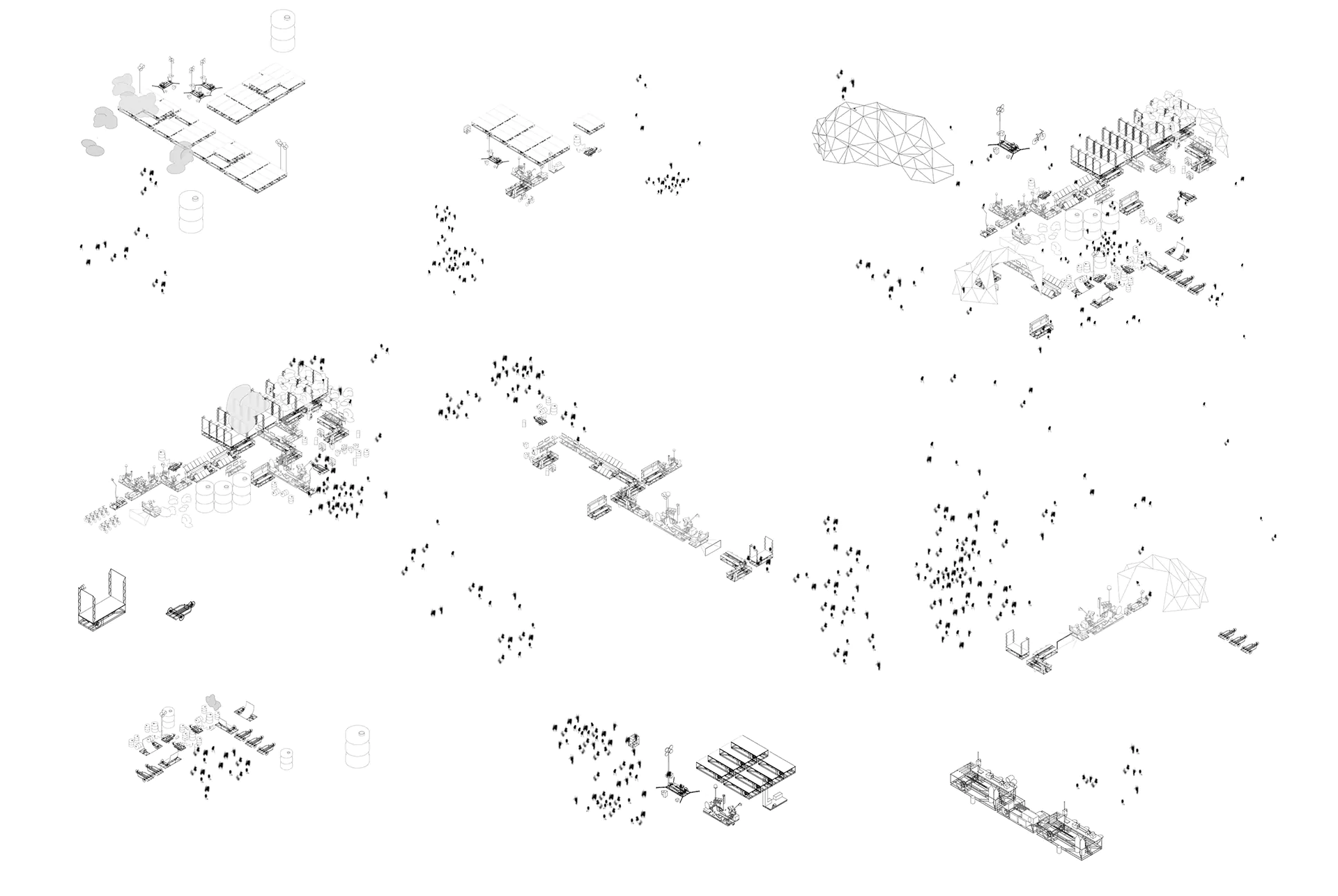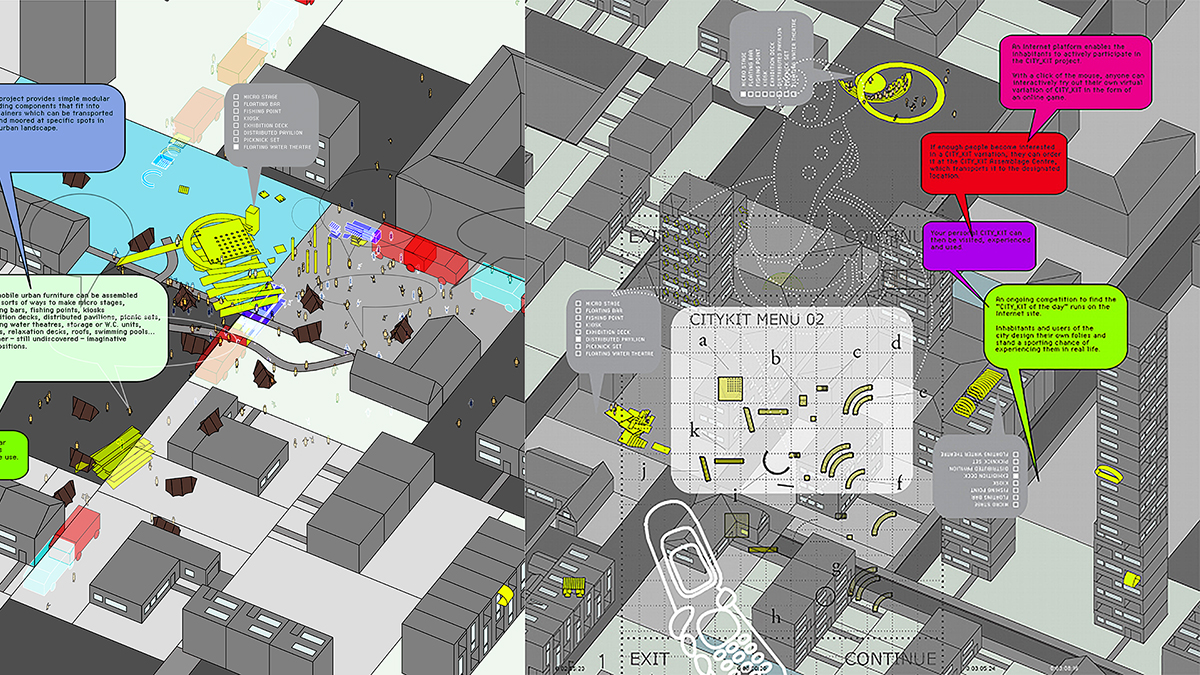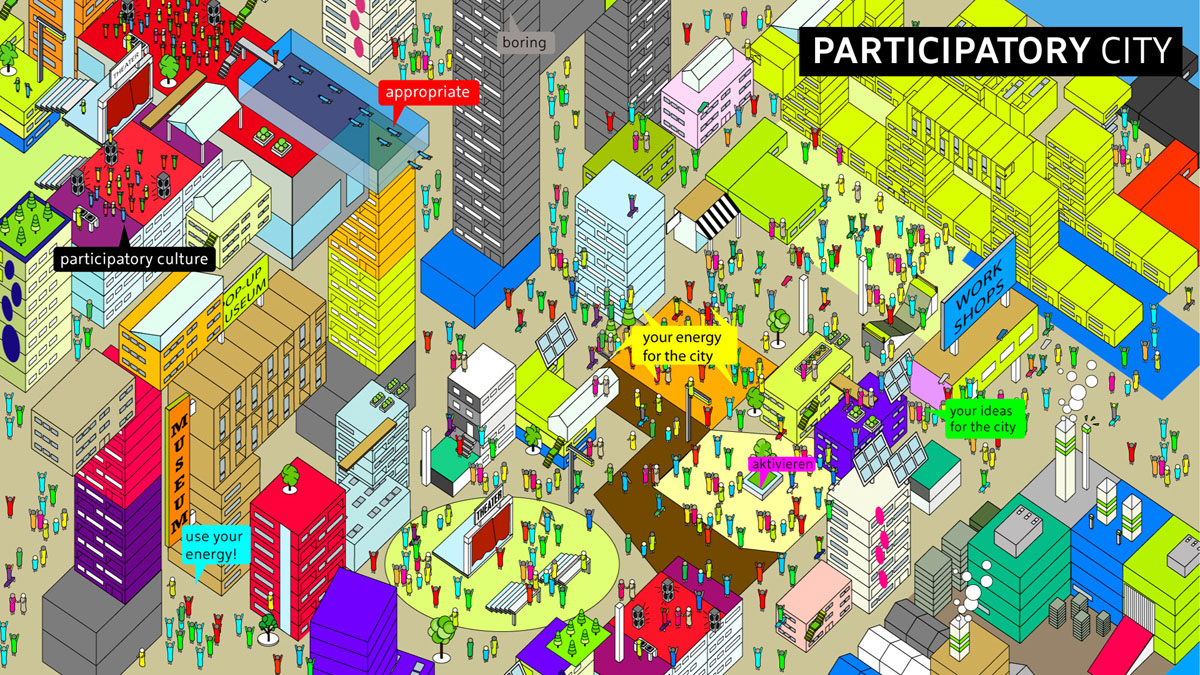Kiez Lab is a hybrid (combined physical-digital) low-threshold cross-sector neighbourhood lab with inclusive co-creative formats to permanently bring local perspectives and civil society experiences into the digital transformation of the City of Berlin.
Research, Concepts, Workshops & Publications Kiez Lab © Hybrid Space Lab, Berlin, 2019~….
Presentation & Workshop Kiez Lab @ Alliance Digital City Berlin, Berlin, 2019~2022
Open Lab @ Experimental Space, Weizenbaum Institute, Berlin, 16 January 2020
Publication Post COVID-19 City @ Marlowes Online Magazin for Architectur and City, Stuttgart, 20 May 2020
Lecture & Workshop Kiez Lab: Participation in the Digital City @ Berlin Science Week, Berlin, 13 November 2020
Concept Kiez Lab @ Berlin Senate Chancellery, Berlin, 20 December 2021
Text Kiez-Lab @ Mein Berlin, Berlin, 20 December 2021
Lecture & Workshop Kiez Lab @ Digital Social Culture in the Neighborhood, Utopolis Federal Association for Social Culture Germany, 16 September 2021
Workshop Smart City Expert @ Berlin Senate Chancellery & CityLAB Berlin, 7 January 2022
Publication Post COVID-19 Hybrid City @ Academy for Media Arts, KHM # 0 Magazine, Cologne, 1 December 2022
Concept Kiez Lab @ Berlin Senate Chancellery, Berlin, 20 December 2021
Research, Concepts, Workshops & Publications Kiez Lab @ Hybrid Space Lab, Berlin, 2019~….
Beyond elitism and technological imperatives, Berlin’s digital strategy needs to align with city dwellers’ and residents’ priorities. Kiez Lab is an inclusive, participative format exploring how this is to be achieved.
The first temporary Kiez Lab is to be organized at regular intervals and in a nomadic “Pop-Up-Principle” in changing neighborhoods and neighborhoods such as libraries, hospitals, or parks in order to assess the long-term structure and potential prototype the Kiez Lab. Currently planned formats are keynote speeches, dialogical forums, and workshops aimed at the broadest possible public. A particular concern here is learning from and with other cities and initiatives that, like Berlin, have committed themselves to the goals of the “Cities Coalition for Digital Rights”.
The long-term goal is to further develop and consolidate the Kiez Lab format in order to permanently contribute local perspectives and experiences of Berlin’s civil society to the digital transformation of the city of Berlin. Kiez Lab must therefore be a fundamental component of Berlin’s digital strategy at an early stage.
Text Kiez-Lab @ Mein Berlin, Berlin, 20 December 2021
Kiez-Labs are hybrid (combined physical-digital) low-threshold cross-sector neighbourhood labs with inclusive co-creative formats to permanently bring local perspectives and experiences of civil society into the digital transformation of the city of Berlin. They are pop-up workshops embedded in the urban context with analogue points of contact in the neighbourhood – in typical neighbourhood locations such as libraries, hospitals, old people’s homes, schools or parks. The Kiez-Lab concept was developed in the context of the Alliance Digital City Berlin and the Kiez-Labs are much more than decentralised digital citizens’ offices. Such socio-spatially embedded neighbourhood labs, which reflect the urban society, are combined physical and digital, i.e. hybrid co-creative tools and communication spaces to accompany the digital transformation.
Presentation & Workshop Kiez Lab @ Alliance Digital City Berlin, Berlin, 5 August 2019
Christian Grauvogel, HIIG | re:Kreators – Network for Civil Society Urban Development in Europe
Prof. Elizabeth Sikiaridi, Hybrid Space Lab
Prof. Frans Vogelaar, Hybrid Space Lab
Felix Hartenstein, TU Dresden | Inwista | Urbanophil
Hişar Ersöz, studio amore
Leon Jank, studio amore
Prof. Melanie Humann, Institute for Urban Design and Urban Research | TU Dresden
Moritz Sulger
Starting in 2019, Berlin will develop a digital strategy in which goals for the digital future of the capital will be formulated. The development of such a digital strategy, like the digital transformation itself, is a dynamic process that requires continuous management, support and reflection. In Berlin, there is already a diverse patchwork of very different initiatives and people at the local level who are practically testing visions and ways of a collaborative and common good-oriented digitalisation. This potential must be made visible and used in the future development of Berlin’s digital strategy.
The challenges of digital transformation are becoming increasingly tangible in the everyday lives of Berliners. There is an increasing need to get involved and take the digital future of the city into their own hands. Starting in 2019, Berlin will develop a digital strategy in which goals for the capital’s digital future will be formulated. The development of such a digital strategy, like the digital transformation itself, is a dynamic process that requires continuous management, support and reflection. In Berlin, there is already a diverse patchwork of very different initiatives and people at the local level who are practically testing visions and ways of a collaborative digitization oriented toward the common good. This potential must be made visible and used in the future development of Berlin’s digital strategy.
To this end, we propose the establishment of Berlin Kiez-Labs: Neighborhood labs to promote public discourse on Berlin’s digital future and to jointly develop Berlin’s digitization strategy. We see Kiez-Labs as a low-threshold discursive format: for joint exploratory learning, for sharing experiences, for experimenting, for negotiating conflicts, for instigating collaborations – and as a local, socio-spatially embedded complement to the newly established City Lab.
During an initial test phase, we will organize the first temporary neighborhood labs at regular intervals and in a nomadic “pop-up principle” in changing Berlin neighborhoods and typical neighborhood locations, such as libraries, hospitals, or parks, in order to prototypically test the long-term design and potential of the neighborhood labs. Currently planned formats are impulse lectures, dialogical forums and workshops, which are aimed at as broad a public as possible. A particular concern here is learning from and with other cities and initiatives that, like Berlin, have committed themselves to the goals of the Cities Coalition for Digital Rights.
The long-term goal is to further develop and stabilize the Kiez Labs format in order to permanently incorporate local perspectives and experiences of Berlin’s civil society into the digital transformation of the city of Berlin. The neighborhood labs must therefore be a fundamental component of Berlin’s digital strategy at an early stage.

Open Lab @ Experimental Space, Weizenbaum Institute, Berlin, 16 January 2020
Eva Möhrchen, bUm Raum für engagierte Zivilgesellschaft
Dr. Benjamin Seibel, CityLab
Arthur Röing Baer, Trust Coworking
Representatives of der c-base
Prof. Elizabeth Sikiaridi and Prof. Frans Vogelaar, Hybrid Space Lab
Elizabeth Calderon Lüning, KiezDigital
17.00: Welcome by Prof. Dr. Gesche Joost
17.15: Input by Dr. Bianca Herlo: Technologization of Spaces
17.30: Presentation of the participants and questions from the moderator
18.00: Public Discussion
19.00 End
In digital spaces and formats of debate, learning and teaching and democratic participation, the digital transformation is negotiated and asked which digital futures we want to create and be part of. Some initiatives such as the CityLAB Berlin, bUm_Raum for committed civil society, the Verschwörhaus and KiezDigital work together with citizens and communities at the local level and in a way that is oriented towards the common good. In the workshop discussion, we want to ask which formats and strategies have proven their worth, speak openly about difficulties, successes and insights and create a space for collective learning. You are cordially invited to take part in the conversation!
Hybrid Space Lab and Digital City Alliance Berlin propose the establishment of Kiez Labor: Neighbourhood Labs to promote public discourse on Berlin’s digital future and to jointly develop Berlin’s digitisation strategy. We understand Kiez Lab as a low-threshold discursive format: for joint research-based learning, for exchanging experiences, for experimenting, for negotiating conflicts, for instigating cooperations – and as a local, socio-spatially embedded complement to the newly established City Lab.
During an initial test phase at regular intervals and in a nomadic “pop-up principle” in changing Berlin neighbourhoods and typical neighbourhood locations such as libraries, hospitals or parks, the first temporary neighbourhood labs can be organised to test the long-term design and potential of the neighbourhood labs as a prototype.
Currently planned formats include keynote speeches, dialogue forums and workshops aimed at as broad a public as possible. A special concern here is learning from and with other cities and initiatives that, like Berlin, have committed themselves to the goals of the “Cities Coalition for Digital Rights”.
The long-term goal is to further develop and stabilise the Kiez Lab format in order to permanently incorporate local perspectives and experiences of Berlin’s civil society into the digital transformation of the city of Berlin. The Kiez Labs must therefore be a fundamental component of Berlin’s digital strategy at an early stage.

Lecture & Workshop Kiez Lab: Participation in the Digital City @ Berlin Science Week, Berlin, 3 November 2020
Dr. Benjamin Seibel, Leiter CityLAB Berlin
Moritz Ritter, Liquid Democracy e.V.
Prof. Elizabeth Sikiaridi, Hybrid Space Lab
From 2019 the City of Berlin is developing a digital strategy in which goals for the digital future of the capital are to be formulated. The development of such a digital strategy, as well as the digital transformation itself, is a dynamic process that requires continuous control, monitoring and reflection. In Berlin there is already a diverse patchwork of very different initiatives and people on the local level, who are practically testing out the visions and ways of a community and public welfare-oriented digitization. This potential must be made visible and used in the future development of Berlin’s digital strategy.
Berlin’s digital policy is entering the next round: the city received 11 million euros in Smart City funding from the Ministry of the Interior, the Green Paper on the Berlin digitalization strategy is published, and the 2015 Smart City strategy is also to be revised. Calls for “participation” are omnipresent. Urban society should be involved in the digital transformation, human-friendly and oriented towards the common good, with online participation processes, focus groups, and citizen dialogues.
But the grand promises of participation brought rather sobering results in the past. Therefore, the question arises again: What does a successful participation process in the hybrid city look like? How can the complex new digital technologies and their effects on city life be communicated and made open for discussion in general?
In the online ideation workshop, we jointly develop inclusive formats and ways of taking part in the Smart City transformation. To this end, we first receive inputs on successful municipal participation processes in digital and physical space.
Afterwards, concrete tools and procedures are discussed with participants on how the path to the digital city of Berlin can be better aligned to people’s needs. The results of the ideation workshop are documented by the Digital City Alliance Berlin and carried into the political process.
The Smart City does not have to be an elite project! The Digital City Alliance Berlin, CityLAB Berlin, the Weizenbaum Institute, and the Einstein Center Digital Future welcome participants to a joint discussion on what political participation in the digital city can look like.
Beyond elitism and technological constraints, Berlin’s digital strategy must be guided by the priorities of the city’s inhabitants and residents. The Kiez Lab is an inclusive, participatory format that explores how this can be achieved.
Digital transformation is raising many questions. The urbanization of technology is a dynamic process that requires continuous control, monitoring and reflection. How can these developments be socially processed in the interaction between civil society, experts and politics? What would be the best suited and most adaptive formats for this and how could the corresponding ‘process spaces’ reflect the complexity of physical urban society?
The access and participation in the digital spheres of non-digital-affine social groups should also be considered. The importance of this became very clear during the pandemic, with elderly fellow citizens, belonging to the risk groups, with comparatively insufficient digital skills as well as socially disadvantaged families without digital infrastructure, having no access to important health and education services and social life. How can we guarantee to “leave no one behind”?
One example is a project, launched to permanently bring local perspectives and civil society experiences to the digital transformation: the Kiez Lab, developed in the context of the Digital City Alliance Berlin. These district-based labs are designed as low-threshold and inclusive discursive formats, embedded in an urban context with physical neighborhood points of contact, and also as temporary laboratories in typical neighborhood facilities such as libraries, hospitals, old people’s homes, schools or parks.
Kiez Lab, integrated in the city and representing the urban society, are hybrid, combined physical and digital tools, to process digital transformation. The exchange on our common futures requires a broad social debate with new forms of hybrid dialogue between politics, science, business, culture and civil society, using physical and digital tools and communication spaces, in order to address the questions: how do we want to live together, and, crucially, in which cities?
Lecture & Workshop Kiez Lab @ Digital Social Culture in the Neighborhood, Utopolis Federal Association for Social Culture Germany, 16 September 2021
The federal program “Utopolis – Socioculture in the Neighborhood” is made possible as a cross-departmental strategy within the framework of the “Socially Integrative City” funding program by the Federal Government Commissioner for Culture and the Media (BKM) and the Federal Ministry of Housing, Urban Development and Construction. In four-year development processes, sociocultural centers nationwide are testing new creative participation formats under the question of how art and culture can be used for the coexistence of society in urban neighborhoods.
One focus is on identifying suitable artistic methods for reaching a diverse neighborhood and encouraging residents who have had little previous contact with art and culture to actively participate in shaping their living environment. Networking with local initiatives and institutions plays a major role here – with the neighborhood management as well as with social associations, municipal administration and business enterprises. All results and experiences are bundled and made available on this website. Imitation is expressly encouraged!
The cultural district work has been very creative and innovative in dealing with the challenges of the pandemic. New digital and hybrid formats were developed to connect people, enabling participation in the neighborhood, and keeping the district alive despite contact restrictions. Socioculture has reached its limits in this regard. At the same time, however, new paths and possibilities have been opened up.
The online conference “Digital Socioculture in the Neighborhood. New Formats for District Work” experiments with a platform for online encounters, with digital formats and interactive artistic methods.
Investigation into the future of cultural spaces requires looking at physical, urban spaces together with digital media networks. With the increasing hybridity of the digital and the physical, new forms of participation in social cultural life are emerging – also in and from the neighborhood.
To this end, the concept of the Kiez Lab was developed in the context of the Alliance Digital City Berlin: Kiez Labs are designed as low-threshold neighborhood labs with inclusive discursive formats. They are temporary workshops embedded in the urban context with interfaces with the physical neighborhood – in typical places such as libraries, hospitals, old people’s homes, schools or parks.
The workshop, curated by Hybrid Space Lab, starts with a short presentation of the Kiez Lab concept and of locally embedded hybrid formats that allow to involvement of the urban society in cultural co-creation processes. Workshop participants then develop ideas for inclusive hybrid spaces embedded in the city with inspiring hybrid formats for cultural collaborations.
Workshop Smart City Expert @ Berlin Senate Chancellery and CityLAB Berlin, 7 January 2022
Since fall 2020, Berlin has been working on a new Smart City strategy as a Smart City model project funded by the German Federal Ministry of the Interior and Community (Bundesministerium des Innern und für Heimat). This new strategy is being formulated with the broad participation of the city’s population. In August 2021, the basis of the Smart City strategy, the so-called Strategic Framework, was adopted by the Berlin Senate.
In second major participation phase, from November 2021 to May 2022, CityLAB Berlin is coordinating under the leadership of the Senate Chancellery a broad-based participation process in order to finalize Berlin’s Smart City strategy and its concrete operational goals, measures and controlling elements. This broad-based participation process consists of four strands:
⋅ a public participation for all Berliners via mein.berlin.de,
⋅ the cooperation of randomly selected Berliners in a city committee,
⋅ the involvement of employees from the Berlin administration, and
⋅ the impulses of experts to ensure professional input in the process.
As our work at Hybrid Space Lab testifies, we believe that the future challenges that urban societies at large will face defy the focus of Metaverse. We don’t need – and, most importantly, don’t want – to project ourselves and future generations in an after-world, be it a company-owned alternative uni-verse, or a Planet B. The digital challenges of today and tomorrow should be met with situated approaches.
Kiez Lab can be a short-term, versatile instrument to trial approaches to address Berliners’ digital challenges in a hybrid, locally embedded and globally networked way, creating the opportunity to learn how urban societies near and far are coping with their respective crises and settings, and how citizenry may become genuinely involved in shaping the future.
With an emphasis on public spaces stemming from the long-standing European tradition, Kiez Lab emerges as a hybrid, locally embedded and yet globally networked response to Berliners’ digital challenges.

related PROJECTS
related NEWS